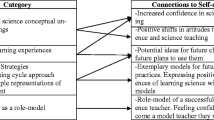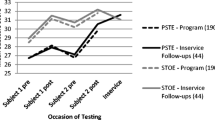Abstract
Two common reasons elementary preservice teachers have low self-efficacy with science teaching is their lack of content knowledge and past negative experiences with science teaching or learning. Holding low self-efficacy beliefs has negative impacts on both the method of science instruction and amount of science instruction delivered in the elementary classroom. Many researchers have successfully explored methods for improving elementary preservice teachers’ science teaching self-efficacy by providing positive, inquiry-based learning experiences during a science methods course, but the present study explores how to improve elementary preservice teachers’ science teaching self-efficacy beliefs by engaging them in socioscientific issues (SSI) during their elementary methods course. Using a mixed methods approach, we collected quantitative with the science teaching efficacy beliefs instrument part B (STEBI-B) and qualitative data through short answer responses focused on understanding their perceptions and confidence with science instruction. Our analysis of the qualitative data focused on identifying the influences for any change that resulted from the STEBI results. Our findings illustrate SSI as a commonly identified reason for positive changes in general science teaching self-efficacy. Implications for utilizing SSI as an approach to combat low science teaching self-efficacy are discussed.
Similar content being viewed by others
References
Akyol, G., Tekkaya, C., Sungur, S., & Traynor, A. (2012). Modeling the interrelationships among pre-service science teachers’ understanding and acceptance of evolution, their views on nature of science and self-efficacy beliefs regarding teaching evolution. Journal of Science Teacher Education, 23(8), 937–957. https://doi.org/10.1007/s10972-012-9296-x.
Appleton, K., & Kindt, I. (1999). Why teach primary science? Influences on beginning teachers’ practices. International Journal of Science Education, 21(2), 155–168. https://doi.org/10.1080/095006999290769.
Avery, L. M., & Meyer, D. Z. (2012). Teaching science as science is practiced: Opportunities and limits for enhancing preservice elementary teachers’ self-efficacy for science and science teaching. School Science and Mathematics, 112(7), 395–409. https://doi.org/10.1111/j.1949-8594.2012.00159.x.
Bandura, A. (1977). Self-efficacy: Toward a unifying theory of behavioral change. Psychological Review, 84, 191–215.
Bandura, A. (1994). Self-efficacy. In V. S. Ramachaudran (Ed.), Encyclopedia of human behavior (Vol. 4), 71–81. New York: Academic Press.
Bleicher, R. E. (2004). Revisiting the STEBI-B: Measuring self-efficacy in preservice elementary teachers. School Science and Mathematics, 104(8), 383–391. https://doi.org/10.1111/j.1949-8594.2004.tb18004.x.
Cervato, C., & Kerton, C. (2017). Improving the Science Teaching Self-Efficacy of Preservice Elementary Teachers: A Multiyear Study of a Hybrid Geoscience Course. Journal of College Science Teaching, 47(2). https://doi.org/10.2505/4/jcst17_047_02_83.
Cinici, A. (2017). Pre-service Teachers’ Science Teaching Self-efficacy Beliefs: The Influence of a Collaborative Peer Microteaching Program. Mentoring & Tutoring: Partnership in Learning, 24(3), 228–249. https://doi.org/10.1080/13611267.2016.1222812.
Coladarci, T., Cobb, C. D., Minium, E. W., & Clarke, R. C. (2014). Fundamentals of statistical reasoning in education (Fourth Edition). Hoboken, NJ: John Wiley & Sons.
Enochs, L., & Riggs, I. (1990). Further development of an elementary science teaching efficacy belief instrument: A preservice elementary scale. School Science and Mathematics, 90, 694–706.
Flores, I. M. (2015). Developing Preservice Teachers' Self-Efficacy through Field-Based Science Teaching Practice with Elementary Students. Research in Higher Education Journal, 27, 1–19.
Forbes, C. T., & Davis, E. A. (2008). The development of preservice elementary teachers’ curricular role identity for science teaching. Science Education, 92(5), 909–940. https://doi.org/10.1002/sce.20265.
Greene, J. C. (2007). Mixed methods in social inquiry (Vol. 9). San Francisco, CA: John Wiley & Sons.
Gunning, A. M., & Mensah, F. M. (2011). Preservice elementary teachers’ development of self-efficacy and confidence to teach science: A case study. Journal of Science Teacher Education, 22(2), 171–185. https://doi.org/10.1007/s10972-010-9198-8.
Hesse-Biber, S. N. (2010). Mixed methods research: Merging theory with practice. New York: Guilford Press.
Hestness, E., McGinnis, J. R., Riedinger, K., & Marbach-Ad, G. (2011). A Study of Teacher Candidates’ Experiences Investigating Global Climate Change Within an Elementary Science Methods Course. Journal of Science Teacher Education, 22, 351–369. https://doi.org/10.1007/s10972-011-9234-3.
Ilhan, N., Yilmaz, Z. A., & Dede, H. (2015). Attitudes of pre-service science teachers towards educational research and their science teaching efficacy beliefs in Turkey. Journal of Baltic Science Education, 14(2).
Kazempour, M., & Sadler, T. D. (2015). Pre-service teachers’ science beliefs, attitudes, and self-efficacy: A multi-case study. Teaching Education, 26(3), 247–271. https://doi.org/10.1080/10476210.2014.996743.
Kılınç, A., Kartal, T., Eroğlu, B., Demiral, Ü., Afacan, Ö., Polat, D., et al. (2013). Preservice science teachers’ efficacy regarding a socioscientific issue: A belief system approach. Research in Science Education, 43, 2455–2475. https://doi.org/10.1007/s11165-013-9368-8.
Kırık, Ö. T. (2013). Science teaching efficacy of preservice elementary teachers: examination of the multiple factors reported as influential. Research in Science Education, 43(6), 2497–2515. https://doi.org/10.1007/s11165-013-9357-y.
Kinskey, M. (2018). Using action research to improve science teaching self-efficacy. International Journal of Science Education, 40(15), 1795–1811. https://doi.org/10.1080/09500693.2018.1502898.
Menon, D., & Sadler, T. (2016). Preservice elementary teachers’ science self-efficacy beliefs and science content knowledge. Journal of Science Teacher Education, 27, 649–673. https://doi.org/10.1007/s10972-016-9479-y.
Menon, D. (2020). Influence of the sources of science teaching self-efficacy in preservice elementary teachers’ identity development. Journal of Science Teacher Education, 1-22. https://doi.org/10.1080/1046560X.2020.1718863.
National Research Council [NRC]. (2012). Discipline-based education research: Understanding and improving learning in undergraduate science and engineering. Washington DC: National Academies Press.
Palmer, D., Dixon, J., & Archer, J. (2017). Using situational interest to enhance individual interest and science-related behaviours. Research in Science Education, 47(4), 731–753. https://doi.org/10.1007/s11165-016-9526-x.
Pitiporntapin, S., Yutakom, N., & Sadler, T. D. (2016, December). Thai pre-service science teachers' struggles in using Socio-scientific Issues (SSIs) during practicum. In Asia-Pacific Forum on Science Learning & Teaching 17(2), 1–20.
Ramey-Gassert, L., & Shroyer, M. G. (1992). Enhancing science teaching self-efficacy in preservice elementary teachers. Journal of Elementary Science Education, 4(1), 26–34.
Ramey‐Gassert, L., Shroyer, M. G., & Staver, J. R. (1996). A qualitative study of factors influencing science teaching self‐efficacy of elementary level teachers. Science Education, 80(3), 283–315. https://doi.org/10.1002/(SICI)1098-237X(199606)80:3<283::AID-SCE2>3.0.CO;2-A.
Rundgren, C. J., Eriksson, M., & Rundgren, S. N. C. (2016). Investigating the intertwinement of knowledge, value and experience of upper secondary students’ argumentation concerning socioscientific issues. Science & Education, 25, 1049–1071. https://doi.org/10.1007/s11191-016-9859-x.
Sadler, T. D. (2011). Socio-scientific issues-based education: What we know about science education in the context of SSI. In Socio-scientific Issues in the Classroom (pp. 355–369). New York: Springer
Sadler, T. D., Romine, W. L., & Topçu, M. S. (2016). Learning science content through socio-scientific issues-based instruction: A multi-level assessment study. International Journal of Science Education, 38(10), 1622–1635. https://doi.org/10.1080/09500693.2016.1204481.
Saunders, K. J., & Rennie, L. J. (2013). A pedagogical model for ethical inquiry into socioscientific issues in science. Research in Science Education, 43, 253–274. https://doi.org/10.1007/s11165-011-9248-z.
Trauth-Nare, A. (2015). Influence of an intensive, field-based life science course on preservice teachers’ self-efficacy for environmental science teaching. Journal of Science Teacher Education, 26(5), 497–519. https://doi.org/10.1007/s10972-015-9434-3.
Usher, E. L., Ford, C. J., Li, C. R., & Weidner, B. L. (2019). Sources of math and science self-efficacy in rural Appalachia: A convergent mixed methods study. Contemporary Educational Psychology, 57, 32–53. https://doi.org/10.1016/j.cedpsych.2018.10.003.
Walker, K. A., & Zeidler, D. L. (2007). Promoting discourse about SSI through scaffolded inquiry. International Journal of Science Education, 29(11), 1387–1410. https://doi.org/10.1080/09500690601068095.
Watters, J. J., & Ginns, I. S. (2000). Developing motivation to teach elementary science: Effect of collaborative and authentic learning practices in preservice education. Journal of Science Teacher Education, 11(4), 301–321. https://doi.org/10.1023/A:1009429131064.
Webb, D. L., & LoFaro, K. P. (2020). Sources of engineering teaching self‐efficacy in a STEAM methods course for elementary preservice teachers. School Science and Mathematics, 120(4), 209–219. https://doi-org.ezproxy.lib.usf.edu/10.1111/ssm.12403.
Yoon, S., Pedretti, E., Pedretti, L., Hewitt, J., Perris, K., & Van Oostveen, R. (2006). Exploring the use of cases and case methods in influencing elementary preservice science teachers’ self-efficacy beliefs. Journal of Science Teacher Education, 17(1), 15–35. https://doi.org/10.1007/s10972-005-9005-0.
Zeidler, D. L. (Ed.). (2003). The role of moral reasoning on socioscientific issues and discourse in science education (Vol. 19). Berlin: Springer Science & Business Media.
Zeidler, D. (2014). Socioscientific Issues as a curriculum emphasis: Theory, research and practice. In N. G. Lederman & S. K. Abell (Eds.), Handbook of research on science education (Vol. 2). New York: Routledge.
Zeidler, D. L., & Kahn, S. (2014). It’s debatable: Using socioscientific issues to develop scientific literacy, K-12. Arlington: National Science Teachers Association Press.
Author information
Authors and Affiliations
Corresponding author
Rights and permissions
About this article
Cite this article
Kinskey, M., Callahan, B.E. The Influences of Socioscientific Issues on General Science Teaching Self-Efficacy. Res Sci Educ 52, 1451–1465 (2022). https://doi.org/10.1007/s11165-021-09991-9
Accepted:
Published:
Issue Date:
DOI: https://doi.org/10.1007/s11165-021-09991-9




